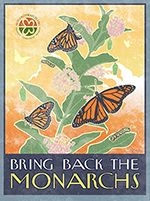Why Do This?
Bring Back the Monarchs and Other Native Pollinators
“Monarch Migration Plunges to Lowest Level in Decades” reports The New York Times. That and other recent headlines* describe the decline of the Monarch butterfly, known for its beauty and for its remarkable 2,500 mile migration to overwintering grounds in Mexico. Once a common sighting in backyard gardens, the orange-and-black butterflies are now in jeopardy of collapse. The drop in the Monarch’s population to the lowest point since record-keeping began is attributed by scientists to the widespread use of potent herbicides on farmlands and the extreme drought of the past three years in the Midwest. Luckily, there’s a great deal that you can do to help.
Canary in the Coal Mine

For backyard gardeners, the Monarch is like the canary in the coal mine. Their presence is an indicator of whether your garden offers a healthy and sustainable ecosystem. An eco-garden that nurtures Monarchs is likely to attract hummingbirds, bees and other important pollinators. These creatures, and the flowering plants that support them, contribute to our crucial food chain and the biodiversity of your small corner of the world.
In the last 10 years, the extensive use of potent herbicides on U.S. farmlands and public spaces has decimated the amount of flowering milkweed available for Monarchs to lay their eggs and for their larvae (caterpillars) to eat. This native ‘host plant,’ which once grew in abundance throughout the central and eastern U.S., is essential to the Monarch’s life cycle.
Milkweed is key
If there is NO MILKWEED, there will be NO MONARCHS. It is the only plant on which Monarchs lay their eggs. Monarch caterpillars eat milkweed leaves when young and feed on nectar flowers as adult butterflies. Home gardeners can help to restore the host milkweed by planting these flowers in a garden patch of their own yard. This simple act will help the Monarchs make a comeback.
Before you surrender your yard to rampant invasive plants or launch an herbicidal assault on destructive alien vegetation in an attempt liberate native flora and fauna, let the plight of the Monarch butterflies persuade you to consider a better alternative. Garden naturally for biodiversity without the use of pesticides.


